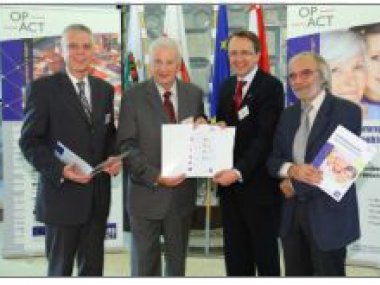OP-ACT Charta for Equivalent Living Conditions in Small and Medium Sized European cities
Edited on
09 October 2017What have in common the Mayors of Leoben (Austria), Altena (Germany), Medias (Romania) or Rezekne (Latvia) ? They all have signed the ![]() Download OP-ACT Signed Declaration Network results (180.42 KB) in Leoben during the Final Conference of the OP-ACT URBACT project, a call for equivalent living conditions in small and medium sized European cities in view of demographic change. OP-ACT partner cities have formulated in this Charta their most important demands directed towards political levels. Topics range from adapted financing strategies, trough modified regional planning concepts, up to tailored immigration policies.
Download OP-ACT Signed Declaration Network results (180.42 KB) in Leoben during the Final Conference of the OP-ACT URBACT project, a call for equivalent living conditions in small and medium sized European cities in view of demographic change. OP-ACT partner cities have formulated in this Charta their most important demands directed towards political levels. Topics range from adapted financing strategies, trough modified regional planning concepts, up to tailored immigration policies.

In the majority of European countries population numbers are declining. At the same time the proportion of senior citizens is continuing to increase. In particular smaller and medium-sized cities are already being affected by this development. Added difficulties arise for these cities because, due to economic structural change, their vulnerability is far greater than that of more major cities. Many small and medium sized cities have already lost up to one-third of their population. Associated with this is reduction in local authority financing and thus also municipalities‘ opportunities to take action in order to respond to these economic and demographic developments.
Municipalities do nevertheless have numerous ways to respond to demographic challenges. As part of the URBACT OP-ACT project ‚Options of actions for the strategic positioning of small and medium sized cities, ten partner cities have developed strategies, policies and instruments for this purpose.
However, unless there is structural support provided by higher level authorities, there is a danger that the downward spiral which is being addressed may perhaps be turning more slowly, but cannot be halted entirely. Regional disparities will then increase, equivalent living conditions throughout the whole of the European Union will diminish.
The cities brought together in OP-ACT are therefore calling upon higher-level authorities - regional and national governments and the European Commission – to give them support in their efforts to respond to the challenges of demographic change. Primary features involved in this include:
- Furthering regional cooperation
- Adjusting finance allocations to problem situations
- Modifying and flexibilising support and funding programmes
- Avoid devolving welfare and social support costs on to cities
- Do not cut back on social facilities or on infrastructure arrangements
- Education and professional training as key components
- Targeted migration and family policies
- Award for innovative small and medium sized cities
The signatories call upon other small and medium-sized cities in Europe to join them in endorsing the OP-ACT declaration.
Read more:
 Download OP-ACT Signed Declaration Network results (180.42 KB) - PDF
Download OP-ACT Signed Declaration Network results (180.42 KB) - PDF- OP-ACT - URBACT website
Submitted by admin on
